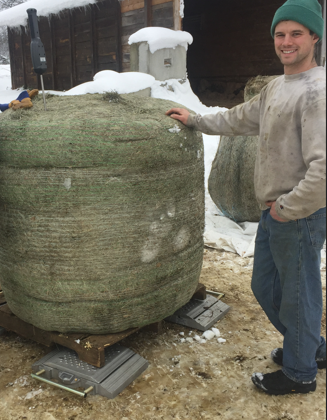Support Small Farms - Local Fund Pool

2025 Orleans County NRCS Local Fund Pool - Improve Forage Quality While Enhancing Natural Resources
In the winter of 2025, the Orleans County Natural Resources Conservation District conducted surveys and hosted three Local Working Group (LWG) in-person meetings. LWG participants concluded that small farm support while protecting natural resources needs to be one of the priorities for the Local Fund Pool proposal to NRCS.
The objectives of this specific funding pool includes supporting small-scale farmers who are struggling with increasing wet growing conditions. Potential projects can include improving forage productivity with lime and wood ash amendments, pasture and hay land seeding, soil health testing, and wetland enhancements with tree and shrub plantings in areas of hay fields and pastures that are too wet to crop.
FY26 Application Due Date: August 22, 2025
Problem statement/need: Water quantity & quality issues and decreased farm productivity: Declining soil health, poor forage quality and, and nutrient losses.
This reduced productivity threatens the economic viability of farms, the preservation of agricultural lands, agricultural heritage and community character, and local food security. Producers face economic struggles, rising costs, climate impacts, and lack infrastructure and technical assistance. There is a particular need to support diversified, small scale, livestock producers, as resources often go to the larger dairy sector. Treatments and support are needed to ensure the economic sustainability of these farms while safeguarding natural resources, particularly water and soil loss. Additionally, with many of Orleans counties soils being poorly drained soils like Cabot silt loam and an increase in rain fall across the state but especially in northeast Vermont there is a need for improved water management management for improved nutrient cycling and forage yields.
Goals: Work with partners to utilize and expand OCNRCD's existing, VAAFM funded, NMP TA programming.
- Conduct Targeted Outreach
- Increase Local Funding: Assist small-scale farmers in implementing conservation practices with local fund pool related to soil health, forage improvements, enhancements and nutrient cycling.
- Provide Tailored Conservation Practices: Develop and implement customized conservation plans that improve agricultural productivity AND enhance agricultural wetland areas.
Project area focus: Small Farms in Orleans County, Vermont with a targeted outreach to beef and diversified livestock producers.
5 Core conservation practices available:
- Nutrient Management (590) -Improve or maintain soil organic matter, improve plant health and productivity and reduce excess nutrients in surface waters.
- Amending Soil with Lime (805) - Improve plant productivity and health, improve plant structure and composition, Improve habitat for soil organisms, improve water quality by increasing plant availability of applied nutrients, and improve aggregate stability.
- Pasture & Hayland Planting (512)- Improve or maintain livestock nutrition and health, provide or increase forage supply during periods of low forage production, reduce soil erosion, improve water quality, and improve soil health.
- Wetland Enhancement (659) - Enhance vegetation and enhance plant and animal habitats.
- Soil Carbon Amendment (336) - Enhance soil health with improved organic matter, storing carbon, stabilizing soil structure, and supporting soil organisms.
10 additional practices are available to support these main practices.
Brief Timeline of Implementation:
- Summer 2025: Outreach and engagement with small farmers
- By December 2025: Assist at least 10 small-scale farmers with assessments and conservation practice planning.
- By May 2026: Develop and provide project management services for to implement 4-6 local fund pool conservation plans.
- Ongoing (3-5 years and potentially beyond): Project implementation continues and OCNRCD continues to work with NRCS to maintain funding for this priority.
Available Funding in Federal FY2026: $200,000
Project Ranking Proirties:
- Is the application addressing forage conditions?
- Does this application include more than three practices?
- Is the application addressing soil conditions?
- Does the applicant produce product(s) that are sold in Orleans County?
- Is the applicant new to NRCS?
- Is the applicant a small farm operation as defined by the VAAFM?
- Does the applicant produce improved nutrient utilization?
- Does the application address the impacts of water quantity?
- Does the application include all five core practices?
Applicants DO NOT need to answer yes to all of the Project Ranking Priorities to apply. However, the more priorities that are addressed, the more likely the application will be selected for funding.
NRCS Application - CPA_1200_V10.2024.pdf